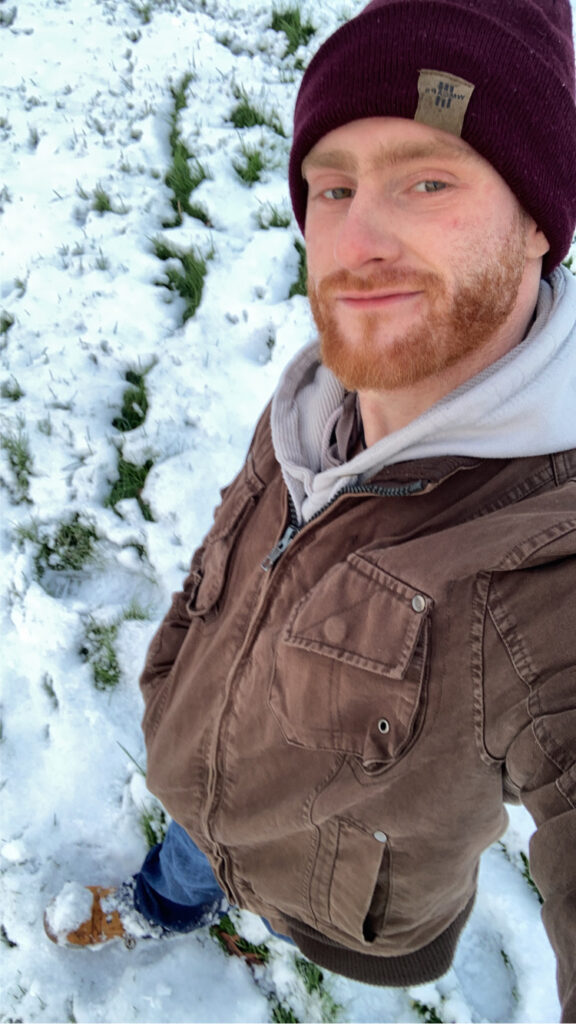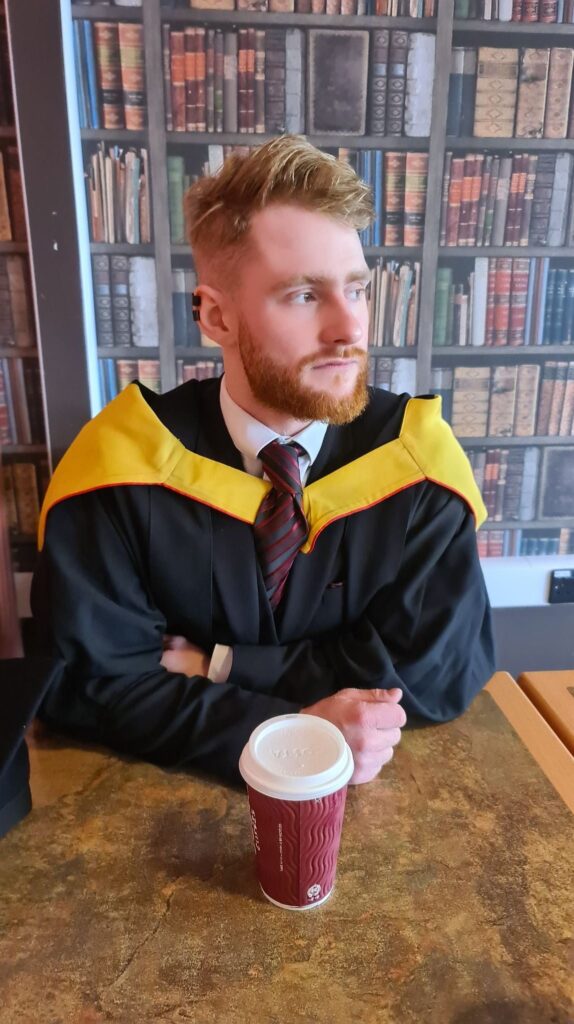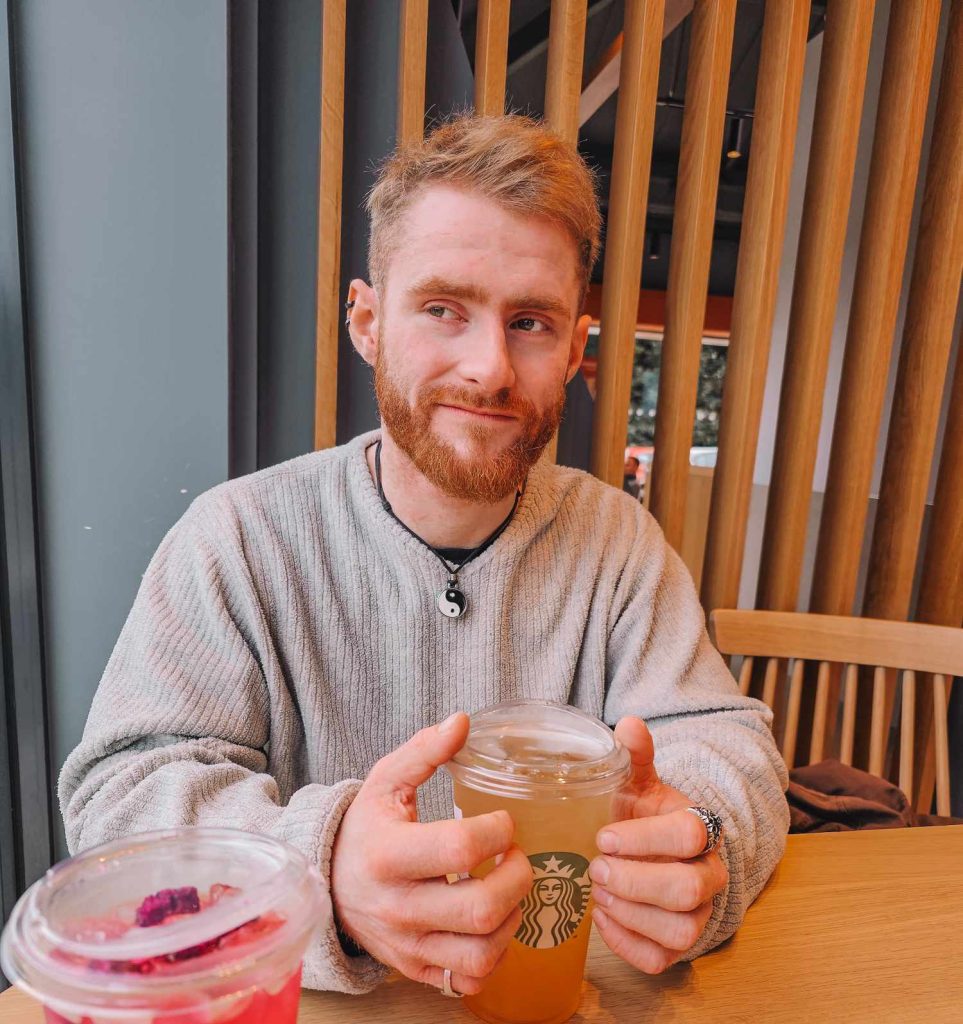Who Are We?
Get Philosophical is a philosophical counselling practice, currently made up only of the founder and director, Christopher Mountford. However, we have plans to expand and create a small, passionate team of philosophers eager to set the groundwork for the newly emerging field of philosophical counselling.
Meet Chris



Life Story 🥱
I was born into a lower income working class family. I was estranged from my biological father and my sister. I grew up in a cold 1-bedroom flat, did poorly at school due to undiagnosed dyspraxia (and possible ADHD, to be confirmed!). In spite of my consistently bad grades at school, I applied to go to university. I applied to 4 universities to do philosophy. I was rejected by all 4 of them. What followed was a gap year when I achieved nothing in my life until October rolled around again. This time I applied to 5 universities for 5 different subjects. I figured if any of them would accept me, then I would study whatever was available to me. Thankfully, I was accepted by Keele to do philosophy on the condition I complete the foundation year. And the rest is history! Throughout my life, I have dealt with a number of mental health struggles. At 11-12, I was diagnosed with anxiety and OCD. For which I was given citalopram on and off for about a decade, later switching to sertraline, which I still take to this day.
That all sounds very sad… and it was! But that didn’t stop me from moving forward and trying to better myself and become comfortable with who I am. At 24 I started to realise I was bisexual, but didn’t fully come out until the age of 25. Thankfully, by that point I already had a network of very accepting friends, many of whom were gay themselves.
Why am I putting all of this deeply personal and sad stuff on my website for my counselling practice? Well, in my private life, I often don’t talk much about it because I like to keep it close to my chest and only open up to those I am close with and trust. But I try to live by what I believe in. and I believe it’s OK to not be OK. Lots of people find it hard to go to counselling, because counselling is hard! Iv been to counselling many times and it’s always difficult. But It’s always usually been very rewarding. And I wouldn’t expect my own clients to open up to me if I can’t admit that I too have been on the other side of the conversation and that I too have dealt with trouble and strife in my life.
So that’s my life story! There’s obviously been a lot of happy moments too, like when I met my estranged sister for the first time, when I got my black belt in Karate, doing an amateur short film for fun and playing dark souls till the sun comes up with my friend and a big bag of Starbursts™️. So, it’s not been all bad! I just wanted to use the space to let people know that iv been through difficulties and that’s one of the reasons I really want to give back and help others using the knowledge I have acquired from my lived experiences and from my education in philosophy.
Career:
When I was in his third year of his undergraduate degree in philosophy, he took part in a module called “philosophical counselling“. This was the start of my professional career. Here I learned that there was a way to take philosophy out of the classroom and into peoples day-to-day lives, and that there was a small but committed community of people doing this! After completing my undergraduate, I started my master’s degree and wrote about “philosophical counselling” (a form of philosophical practice) for my dissertation.
After completing my masters, I decided to take part in a course called “Introduction To Basic Counselling Skills“.
Throughout my studies I was committed to researching, networking and wherever possible, furthering my abilities within philosophical counselling. I was lucky enough to attend the ICPP (international conference for philosophical practice) where I was exposed to the global community of people practising this kind of practical philosophy. I attended paper presentations and workshops and took as many notes as possible. I wrote about my experience in the conference in the KOSAK (Keele-Oxford-St Andrews Kantian Research Centre) journal, which marked my first time being published, on 31st August 2023.
Around this time, me and my mentor, Professor Sorin Baiasu, began the long-winded process of laying down the foundations for a master’s degree at in philosophical counselling after we had been made aware that there are in-fact a number of such master’s degrees in other countries but none in the UK.
It was around this time that I began to lay down the foundations of my own practice in philosophical counselling, the culmination of which you are reading now, Get Philosophical, where I privately offer my services in philosophical counselling, organising philosophical social events (Mind Over Mocha) and managing various social media platforms where I publishes educational philosophical content.
Why Philosophical counselling?
Growing up in a working class background, I never thought I would have the opportunity to go to university. But after a few lucky chance meetings and fortunate circumstances, I found myself studying philosophy at university. As much as I loved philosophy, I often felt guilty and a little ashamed about it. Often reminded by people that “philosophy is useless“, “philosophy is only theoretical” and the bane of most philosophy students, “you will never get a job with philosophy“.
Determined as I was to continue philosophy for the enjoyment of it, I couldn’t shake the feeling that the naysayers were right. Getting a job through philosophy seemed unlikely, and doing anything practical that helps people using philosophy also seemed unlikely.
Thankfully, I elected to take “philosophical counselling” as a third year module and from the first lecture I felt a sense of hope, perhaps philosophical counselling, or more broadly philosophical practice was a way of making philosophy into a career that would have a tangible impact on the lives of others.
Finally, a way to do what I love AND help people at the same time!
I frantically took notes and listened tentatively to every word in those lectures. And later attended the ICPP conference, where I realised that I had already been training in philosophical practice through my work in the philosophy society at Keele. As president of the philosophy society, I had been practising a kind of philosophical practice called the “philo-cafe“.
Realising I had what it takes to work in philosophical practice and that I loved doing it, I put all my efforts into working towards becoming a full-time private philosophical counsellor.
Experience:
Introduction to Basic Counselling Skills
In 2024 Chris started and completed the “Introduction to Basic Counselling Skills” course at Staffordshire university where he learned many of the fundamental practical and ethical standards of psychotherapy. Though Chris does not practise psychotherapy, he felt it important to learn basic ethical and industry standards and bedside manner for practising counselling for his future work in philosophical counselling.
Bachelors and Master’s Degrees in Philosophy
In 2019-2022, Chris started his Bachelors degree in philosophy with a foundation year. His dissertation title was “A Critique Of Contemporary Panpsychism – Why panpsychism can’t save you from being a ghost or a zombie“. Then in 2022-2023, Chris started his master’s degree in philosophy. The title of his dissertation was “Finding Solace In The Struggle – The relationships, benefits and critiques of Roman Stoic philosophy as an approach to philosophical counselling“.
President of Philosophy Society (3 semesters)
In 2022 Chris and some friends re-started the defunct philosophy society which had disbanded due to the Covid-19 pandemic. Chris was the de facto president and created the logo for the rebirth of the society, the new committee gave it a new name “K.U.P.S“, Keele University Philosophy Society, wrote a new constitution and Chris was the sitting president for 3 semesters.
